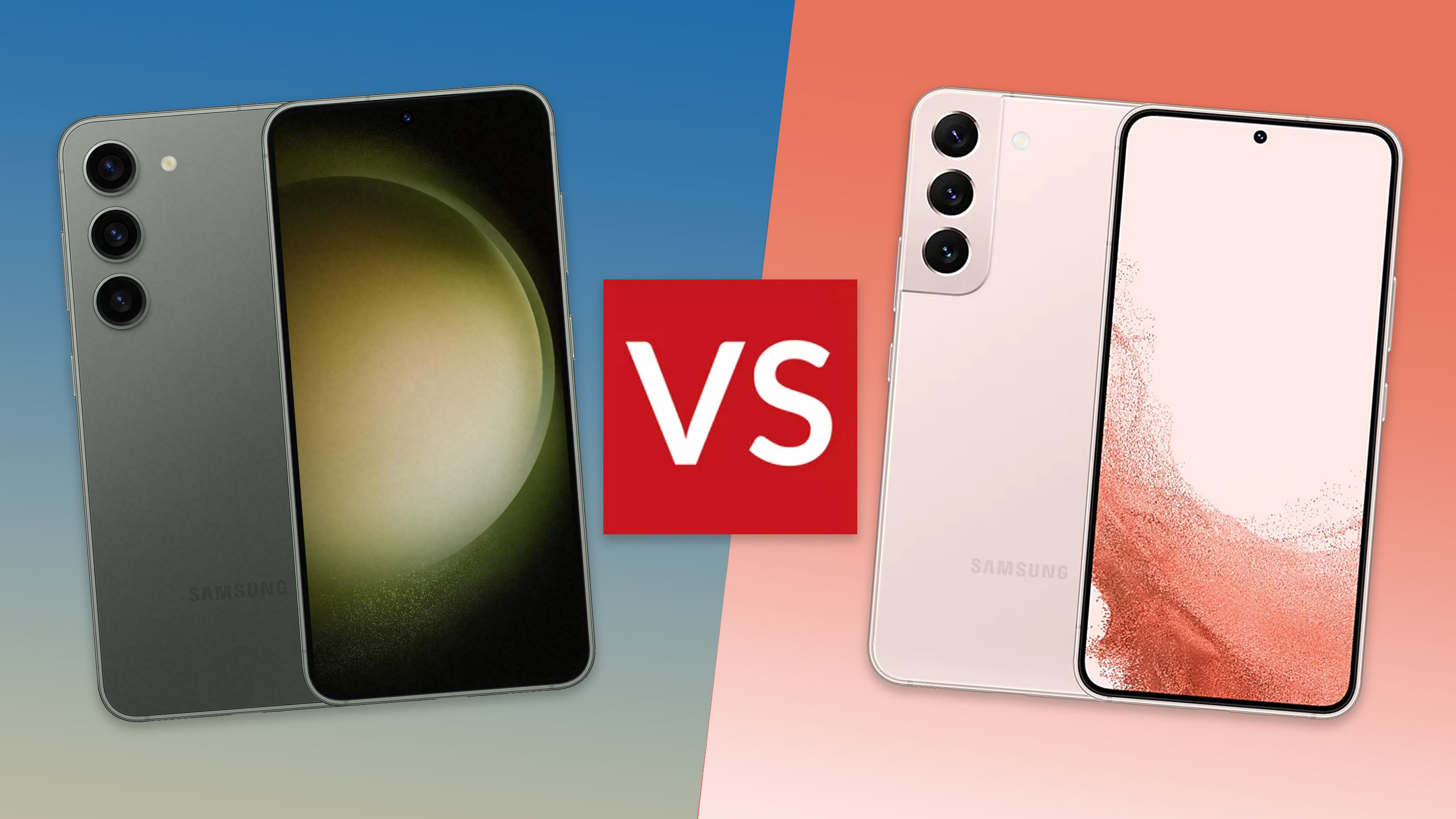Samsung Galaxy S23 vs Galaxy S22: what's new?
Does the Galaxy S23 differ much from the S22? Here are the new features in the smaller-scale Samsung flagship for 2023

Samsung has something for everyone when it comes to the best Android phones. Whether you want top-end Galaxy S23 Ultra with S Pen stylus control, or the smaller-scale Galaxy S23 is the more appealing option.
It's the latter of those which I'm looking at here, comparing Galaxy S23 to its S22 predecessor. Just how different are these phones, released one year apart – does the newer model warrant an instant upgrade, or is too subtle a difference to be worth it for everyone?
I've used the Samsung Galaxy S23 ahead of its Galaxy Unpacked reveal, and having used the Galaxy S22 from last year too, here's how the two devices stack up, pluswhether I think the new model is enough of a change for the series...
Samsung Galaxy S23: What's new?
I've bullet-pointed a summary of how the Galaxy S23 differs from the S22 below, so you can see at a glance where the biggest points of change are between the pair.
Following the below list I'll go into more detail about how the Galaxy S23 differs, which having now seen and used the phone in person I can add my personal perspective to the comments.
I've also featured the larger Galaxy S23 Plus in there, as other its bigger 6.6-inch display and greater battery capacity the changes are one and the same.
- Battery capacity up 200mAh (to 4,500mAh in S23 / 4,700mAh in S23+)
- New design ditches the contoured camera housing
- Colours: Phantom Black, Cream, Green, Lavender
- 12-megapixel selfie camera (up from 10MP)
- Qualcomm Snapdragon 8 Gen 2 processor
- Greater use of recycled parts
- One UI 5.1 software
Samsung Galaxy S23 vs Galaxy S22: Price
The Galaxy S23 and S23 Plus's prices do increase compared to their predecessors. What a difference a year makes, eh?
Get all the latest news, reviews, deals and buying guides on gorgeous tech, home and active products from the T3 experts
The Samsung Galaxy S23 is priced from £849 for the 128GB model, making it just over 6% pricier than the Galaxy S22's launch price of £799.
The Galaxy S23 Plus, meanwhile, starts from £1,049 in the larger-capacity 256GB guise, making it a full £100 pricier, or closer to 11% higher, than its S22 Plus predecessor.
I've arranged both new Galaxy S23 models and the two older Galaxy S22 models side by side in the shopping widget below, so you can see how they compare. The older models are a bargain by comparison really.
Galaxy S23 vs S22: Design & Display
When it comes to the screen, the Galaxy S23 features the very same display as its S22 predecessor. The same can be said for the Galaxy S23 Plus versus S22 Plus too.
The specification is therefore the same: that means a 6.1-inch AMOLED panel with 120Hz refresh rate and 1080 x 2340 resolution in the S23. It's 6.6-inch and the same
1080 x 2340 resolution again in the S23 Plus, meaning theoretically lower sharpness over this larger panel size option.
However, the overall design of the Galaxy S23 and S23 Plus has changed more significantly. The contoured camera housing present in the S22 and S22 Plus has gone, revealing the individual lenses in a similar style to the Ultra model. It unifies the S series I think, giving greater clarity across the range.
In terms of colours there's the same Phantom Black and Green finished this time around, while the introduction of Cream (as photographed) and Lavender provides two new options for the year. Nothing too bright and garish here, though, it's all very subdued stuff – and there are no unique colours for specific models within the range at this stage.
Samsung Galaxy S23 vs S22: Cameras
- Main (23mm): 50-megapixel, f/1.8 aperture, optical stabilisation (OIS)
- Portrait (70mm): 3x zoom with 10MP, f/2.4, OIS
- Wide-angle (13mm): 12MP, f/2.2
- Selfie (25mm): 12MP, f/2.2
The rear camera layout of the Galaxy S23 doesn't change at all compared to the Galaxy S22: it's just the visual arrangement that differs, as pointed out previously.
The only real change of note is the selfie camera, which brings a 12-megapixel snapper to that position, upping it from the 10MP one from the previous model.
If you were hoping for big changes here, or the inclusion of a 200-megapixel main camera as you'll find in the Galaxy S23 Ultra model, then I'm afraid that's not the case. Still, the S series has always been a great camera phone, so it'll still impress.
Galaxy S23 vs S22: Hardware & Software
The Galaxy S23 and S23 Plus each gain additional battery capacity (an extra 200mAh), so longevity per charge should be even better. There's no uprated charging compared to last year though, with 45W wired or 10W wireless being the going rate.
There may be further improvements to how long that battery lasts thanks to the inclusion of Qualcomm's Snapdragon 8 Gen 2 platform too, plus Samsung's new One UI 5.1 software skin over Google's Android 13 operating system.
Samsung Galaxy S23 vs S22: Conclusion
The main difference between the Samsung Galaxy S23 and the Galaxy S22 from the year previous is that the new model looks much more like an 'Ultra Mini' version, with design language that's better unified across the range, complete with its exposed array of rear lenses.
Obviously the removal of a camera housing isn't really sufficient to warrant an instant upgrade, and I suspect you agree, so whether a minor battery increase and uprated processor are enough to grab your attention only you will know.
The way I see it is the Galaxy S23 is a great small-scale Android flagship, but it's designed for those coming from lesser phones, or older devices. Given its price increase compared to the Galaxy S22, too, it'll be hard to not be tempted by the older device (and same goes for S23 Plus versus S22 Plus too).

Mike is T3's Tech Editor. He's been writing about consumer technology for 15 years and his beat covers phones – of which he's seen hundreds of handsets over the years – laptops, gaming, TV & audio, and more. There's little consumer tech he's not had a hand at trying, and with extensive commissioning and editing experience, he knows the industry inside out. As the former Reviews Editor at Pocket-lint for 10 years where he furthered his knowledge and expertise, whilst writing about literally thousands of products, he's also provided work for publications such as Wired, The Guardian, Metro, and more.
